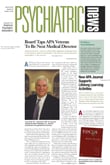In fall 2000, Robert Green, M.D., an associate professor of neurology and director of the clinical corps of Boston University’s Alzheimer’s Disease Center, and his colleagues wanted to answer an important question: Would relatives of persons with Alzheimer’s want to be tested for the gene variant that is known to confer risk for late-onset Alzheimer’s—that is, the “e4” variant of the APOE (apolipoprotein E) gene?
They contacted 196 adult children of living or deceased Alzheimer’s patients through research registries at university health centers in Boston, New York City, and Cleveland to find out. And the answer is a qualified yes, Green and his coworkers reported at the international Alzheimer’s conference in Stockholm in July.
Specifically, of the 196 adult children they contacted, 106 (54 percent) agreed to a phone interview; 55 (28 percent) of those interviewed attended an educational session, and 43 (22 percent) indicated that they were willing to have their blood drawn for an Alzheimer’s risk gene assessment. Those wanting to find out whether they carried the risk gene tended to be younger and more highly educated than those who did not; otherwise, there were no significant differences between the two groups regarding age, marital status, family history of Alzheimer’s, and degree of worrying about developing Alzheimer’s.
After Green and his team found that a number of children of Alzheimer’s patients were interested in being tested for the Alzheimer’s risk gene, they set up what appears to have been the first-ever clinical trial to examine the impact of receiving Alzheimer’s genetic-risk information, including Alzheimer’s risk gene disclosure. Eighty children of Alzheimer’s patients served as trial subjects and were tested for the Alzheimer’s risk gene, while 32 other offspring of Alzheimer’s patients served as controls and were provided Alzheimer’s gene risk assessment on the basis of family history alone.
Green and his colleagues reported at the Stockholm conference that, of the 80 subjects who were tested for the risk gene, 40 were found to have it—which was more or less what they had expected on the basis of the prevalence of the gene in persons from families with Alzheimer’s. A few subjects were found to have two copies of the risk gene.
No Regrets
Nonetheless, 95 percent of the 40 subjects who were found to carry the risk gene said that they would choose gene risk assessment if they had to do it over again, which was comparable to what the 40 subjects who did not have the risk gene said.
The psychological effects of learning that one carries an Alzheimer’s risk gene are still being analyzed, Green told Psychiatric News. But on the surface, those subjects who got the bad news seemed to take it well. In fact, they seemed to be more distressed by other matters in their lives, such as 9/11, than learning that they carried an Alzheimer’s risk gene.
Can Alzheimer’s Be Prevented?
The study efforts by Green and his colleagues raise another crucial question: If people are found to carry one or two copies of the APOE e4 variant, can they do anything to lessen their chances of developing Alzheimer’s? Emerging research results from other quarters suggest that they can.
For instance, Richard Mayeux, M.D., of Columbia University’s Taub Institute for Research of Alzheimer’s Disease and the Aging Brain, and colleagues reported study results in the August Archives of Neurology suggesting that if persons who carry the e4 variant of the APOE gene eat moderately, they may be able to slash their Alzheimer’s risk.
Mayeux and his coworkers selected 1,000 elderly persons with Alzheimer’s disease for a study. They assessed their daily calorie and fat intake, tracked them for four years to see whether they developed Alzheimer’s, and then used their data to determine whether daily calorie-fat intake influenced Alzheimer’s risk while taking the possible presence of the APOE e4 gene variant into consideration.
When subjects without the e4 variant were compared, those who were in the top quarter regarding daily calorie-fat intake turned out to be no more susceptible to Alzheimer’s than were those who were in the lowest quarter for daily calorie-fat intake. In contrast, when subjects with the e4 variant were compared, those in the top quarter of daily calorie-fat intake turned out to be more than twice as likely to develop Alzheimer’s as those who were in the bottom quarter of daily calorie-fat intake.
